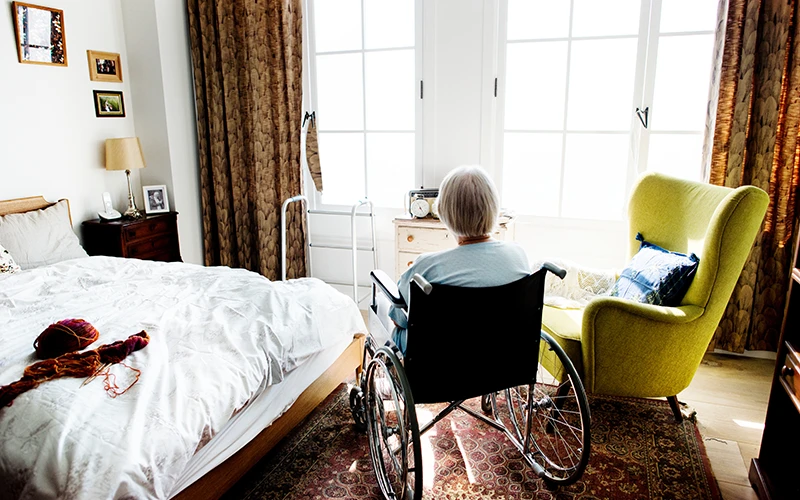From AP News —
By CARLA K. JOHNSON and LAURA UNGAR —
Coronavirus-related hospital admissions are climbing again in the United States, with older adults a growing share of U.S. deaths and less than half of nursing home residents up to date on COVID-19 vaccinations.
These alarming signs portend a difficult winter for seniors, which worries 81-year-old nursing home resident Bartley O’Hara, who said he is “vaccinated up to the eyeballs” and tracks coronavirus hospital trends as they “zoom up” for older adults, but remain flat for younger folks.
“The sense of urgency is not universal,” said O’Hara of Washington, D.C. But “if you’re 21, you probably should worry about your granny. We’re all in this together.”
One troubling indicator for seniors: Hospitalizations for people with COVID-19 rose by more than 30% in two weeks. Much of the increase is driven by older people and those with existing health problems, said Dr. Rochelle Walensky, director of the Centers for Disease Control and Prevention. The numbers include everyone testing positive, no matter why they are admitted.
When it comes to protecting seniors, “we’re doing a terrible job of that in this country,” said Dr. Eric Topol, head of Scripps Research Translational Institute.
As nursing home leaders redouble efforts to get staff and residents boosted with the new vaccine version, now recommended for those 6 months and older, they face complacency, misinformation and COVID-19 fatigue. They are calling on the White House for help with an “all hands on deck” approach.
When it comes to protecting seniors, “we’re doing a terrible job of that in this country,” said Dr. Eric Topol, head of Scripps Research Translational Institute.
As nursing home leaders redouble efforts to get staff and residents boosted with the new vaccine version, now recommended for those 6 months and older, they face complacency, misinformation and COVID-19 fatigue. They are calling on the White House for help with an “all hands on deck” approach.
Easing restrictions, broader immunity in the general population and mixed messages about whether the pandemic is over have softened the sense of threat felt by younger adults. That may be a welcome development for most, but the attitude has seeped into nursing homes in troubling ways.
Getting family consent for vaccinating nursing home residents has become more difficult, nursing home leaders say. Some residents who can give their own consent are declining the shots. Only 23% of nursing home staff are up to date on COVID-19 vaccinations.
Cissy Sanders of Austin, Texas, met multiple obstacles trying to get a booster for her 73-year-old mother, who is in a nursing home. No booster clinic was scheduled. The facility told her they couldn’t find a vaccinator. So she made plans to take her mom to Walgreens later this month.
“I’m concerned about the uptick in hospitalizations and deaths among seniors, and concerned about the lack of urgency at my mother’s nursing home in getting the residents and staff vaccinated” with the latest booster, she said.
Staff and visitors are potential entry points to nursing homes for the virus. The best facilities use a multi-layered approach, protecting residents with masks, screening questions, temperature checks and enhanced infection control.
“What we’ve learned during COVID is that the rate of spread is dependent on the community rate of spread,” said Tina Sandri, CEO of Forest Hills of D.C., a nursing home in the nation’s capital. “I feel safer in my building than anywhere else, including the grocery store.”
Meanwhile, hospitals across the country are seeing an influx of senior patients that Topol calls “pretty alarming.” Nationally, the rate of daily hospital admissions for those 70 and older with confirmed or suspected COVID-19 rose from 8.8 per 100,000 people on Nov. 15, to 12.1 per 100,000 people on Dec. 6, according to statistics from the Department of Health and Human Services. In California and New York, Topol said, hospitalizations for seniors with COVID-19 have already surpassed those during spring and summer omicron waves.
Continue reading at APNews.com.
Find an Elder Law or Special Needs Law Attorney

